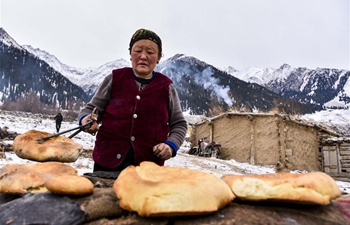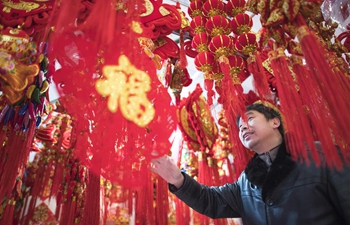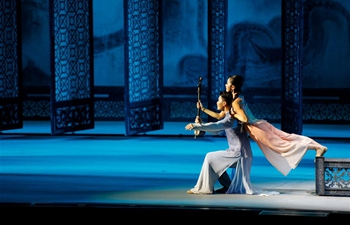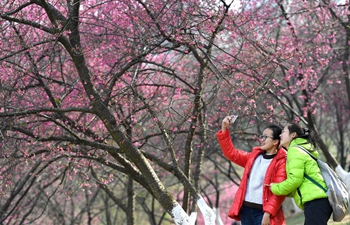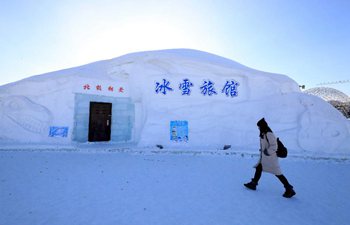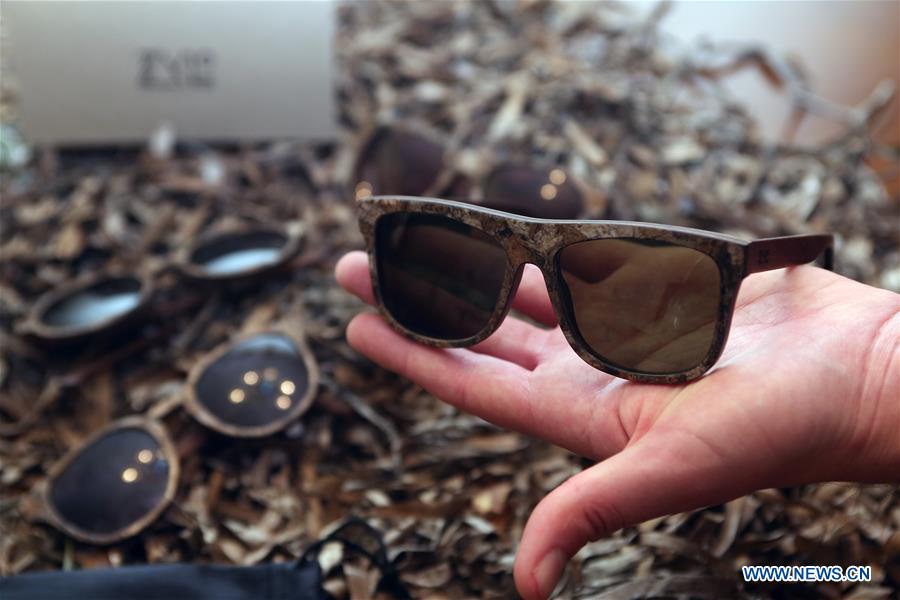
Photo taken on Jan. 31, 2018 shows sunglass frames made of dead leaves of sea grass in Athens, Greece. Hundreds of tons of dead leaves of sea grass are washed up on Greek shores each year. Most of them end up in landfills as waste. Thanks to the young Greek innovator Stravros Tsompanidis, the founder of startup PHEE, an increasing quantity in the past three years has been given a second life after being transformed into unique, useful, ecological products. (Xinhua/Marios Lolos)
by Maria Spiliopoulou, Valentini Anagnostopoulou
ATHENS, Feb. 3 (Xinhua) -- Hundreds of tons of dead leaves of sea grass are washed up on Greek shores each year. Most of them end up in landfills as waste.
Thanks to a young Greek innovator, an increasing quantity in the past three years has been given a second life after being transformed into unique, useful, ecological products.
Stravros Tsompanidis, 24, is the founder of startup PHEE, a company based in the city port of Patras, some 200 kilometers west of Athens.
PHEE designs and manufactures a series of products using Phee-board, an innovative cellulose-based material made of recycled sea grass which has some very interesting qualities and multiple applications, the young entrepreneur told Xinhua in a recent interview.
"The features of the sea grass and the Phee board which is the result of our patented production line is that it is 100 percent water resistant, UV resistant, as a surface it is anti-scratch and also the boards from the sea grass have some very interesting acoustic and thermal insulation properties," he explained.
For his pioneering method to turn dead seaweed into veneer for mobile phone cases, gift boxes, eyeglasses and other accessories, as well as his entrepreneurial spirit, Tsompanidis was included this January in the list of "30 leaders Under 30 (years old)" of Forbes magazine for Europe in the sector of technology. He was selected among more than 1,000 candidates.
Asked about the secret of his success, he said it was a bright idea he came up with while he was still studying finance and banking management at the University of Piraeus. He wanted to do something new, different. But mostly it was hard team work.
Tsompanidis had the idea, but not the capital or the knowhow, so he turned to the real market, donors who embraced his project, and teamed with engineer Nikos Athanassopoulos who became his business partner.
"What makes the success is the people and not the product on its own. It is the people who work hard and implement with innovation their business model... We must keep working hard and the results will come," he said.
The resource that his company is harnessing is the dead leaf of the sea plant Posidonia Oceanica found across the Mediterannean Sea, he explained.
PHEE-board, the flat panel made from Posidonia Oceanica and biological resins can be used to develop high value-added products which will also have a positive impact on the planet's ecosystem. This is Tsompanidis' goal: to promote the values and principles of "green" entrepreneurship and the upcycling of natural resource.
"Our business and our technology is 100 percent eco friendly in terms that during the production we are not producing extra waste. We use natural raw materials, clean energy in the whole production line and this is the most interesting thing in terms of this innovation," he stressed.
"We started from 20 tons and after two years of commercialization we have managed now to recycle more than 250 tons(per year)," the young entrepreneur told Xinhua.
His project has also helped Greek municipalities to save money. Under European regulations, they have to pay 61 euros per ton of seaweed ending up in landfills. Some municipalities now collect the sea grass for PHEE or Tsompanidis does it on his own with his five employees and many volunteers. The dead leaves are cleaned, dried and processed to give the unique items.
"Our first product launched back in 2016 was the Phee cases, the first protective mobiles' cases made of real sea grass that are already placed in the Greek market until today.... We also want to export them in targeted markets abroad," he said.
His company's next steps include partnerships with more brands in Greece and abroad to use phee-boards for flooring and other applications. So far PHEE's products are the results of cooperation with other Greek start ups and can be found in Greek retailers and the company's e-shop.
Asked how he sees the future of young Greeks as himself who have suffered during the eight year debt crisis, he expressed confidence to succeed.
"I am optimistic about the economy and, let' s say, what we can do when we work together and hard," he said.




